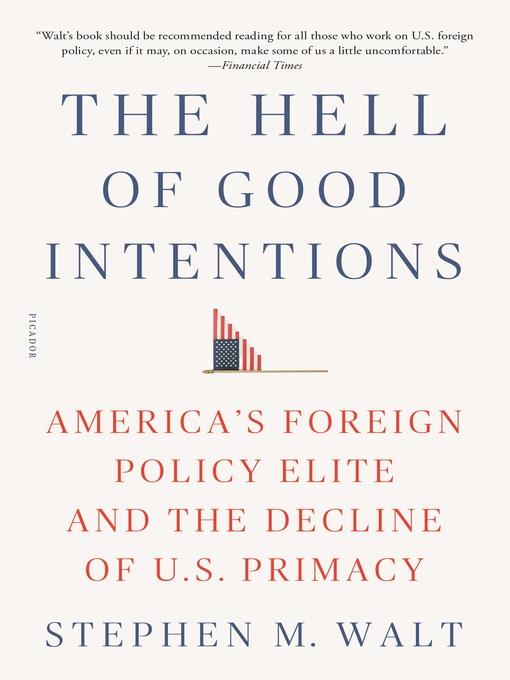
The Hell of Good Intentions
America's Foreign Policy Elite and the Decline of U.S. Primacy
کتاب های مرتبط
- اطلاعات
- نقد و بررسی
- دیدگاه کاربران
نقد و بررسی

August 15, 2018
Want someone to blame for Iraq and Afghanistan? Blame the purveyors of "liberal hegemony," whose blunders paved the way for Donald Trump.The 2016 election, argues Walt (International Affairs/Harvard Univ.; Taming American Power: The Global Response to U.S. Primacy, 2005, etc.), went to dark-horse candidate Trump because voters had sensed, somehow, that something was wrong with the way American foreign policy was being conducted. By his account, the establishment against which Trump railed was invested in the idea that America was the primary superpower and responsible for policing the rest of the world. The end of the Cold War allowed the U.S. to pursue ambitious foreign policy objectives "without having to worry very much about the consequences," some of which would manifest themselves in the rise of Islamism and other reactionary movements. Walt's arguments against "liberal hegemony"--the adjective meaning not leftist in orientation but instead something that "seeks to use American power to defend and spread the traditional liberal principles of individual freedom, democratic governance, and a market based economy"--are coherent if sometimes strident, and his descriptions match what appears to be happening on the ground, such as the emergence of China as a foreign policy rival to the U.S. The author is not altogether against that emergence, for the arrival of a "true peer competitor" provides powerful incentive to overhaul the system and impose greater accountability for unsuccessful outcomes. In the place of the failed grand strategy followed by both Democratic and Republican administrations in the past few decades, Walt proposes a program of "offshore balancing" that would emphasize American interests and promote world peace. Among its tenets is the abandonment of threats of regime change, as with those recently directed against North Korea. Writes the author, "countries usually seek nuclear weapons because they fear being attacked and want a powerful deterrent, and U.S. efforts at regime change heighten such fears."Walt's call for a greatly reduced military presence overseas will appeal to many readers, though his book will find many critics inside the Beltway and his own Harvard Yard.
COPYRIGHT(2018) Kirkus Reviews, ALL RIGHTS RESERVED.

Starred review from August 27, 2018
Walt (Taming American Power), a professor of international affairs at Harvard Kennedy School, decries the American foreign policy of “liberal hegemony” as an abject failure and advocates “offshore balancing” in this thought-provoking work. Walt argues that, since the end of the Cold War, the American foreign policy community—“a highly conformist, inbred professional caste” that has refused to see the error of its ways and is partly responsible for Donald Trump’s electoral victory—has sought ”to spread democracy, markets, and other liberal values around the world,” believing that it “is both essential for U.S. security and easy to do,” as well as “good for the rest of the world.” After several chapters describing how militarized attempts to spread liberty and market-based economies abroad failed during the Clinton, Bush, and Obama administrations, Walt considers President Trump. In his analysis, Trump has combined the worst aspects of liberal hegemony with his own poorly considered attempts to institute “purely transactional” relationships that “forc others to bear the greatest burdens.” Offshore balancing, the alternative Walt proposes, would see the U.S. committing its military forces only when necessary to protect its vital interests and relying on diplomacy and other “soft power” options as its primary means of interacting with the world. This excellent analysis is cogent, accessible, and well-argued.

September 1, 2018
Walt (international affairs, Harvard Univ.; The Origins of Alliances; Revolution and War; Taming American Power) posits that the unique combination of wealth, power, and geography has led to American world dominance, but that U.S. foreign policy has frequently failed, especially since the fall of the Soviet Union. The author faults an entrenched, self-serving, bipartisan foreign policy leadership promoting a broad "liberal hegemony" that does not improve American security. Using both economic and military means to advance disruptive American political ideals and market structures that do not always work in other countries generate both foreign and domestic opposition, which, Walt argues, limits U.S. options while increasing our costs and commitments (e.g., the expansion of NATO). He calls for a more realistic policy that stops exaggerating threats, minimizing costs, and overstating benefits (e.g., Afghanistan and Iraq Wars), with a return to a better balance of power. VERDICT A scholarly yet accessible read. Anyone interested in American foreign policy will want to reflect on Walt's thesis.--Daniel Blewett, Coll. of DuPage Lib., Glen Ellyn, IL
Copyright 2018 Library Journal, LLC Used with permission.

























دیدگاه کاربران